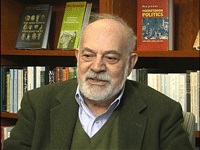I would like to think that there is something meaningful manifest in the fact that I happened upon Dr. Harry Frankfurt‘s somewhat-philosophical work [amazonify]0691122946::text:objectrue0a-20:::On Bullshit[/amazonify] on the same day that I started doing actual practice essays for my upcoming GRE. Frankfurt’s piece is remarkably

short, and contains a few interesting observations about the supposed nature of “bullshit”–the sort of deceptive claptrap/hogwash which Frankfurt sees as utterly ubiquitous. While I wouldn’t award the book any prizes for exhibiting exhaustiveness or exceptional reasoning–nor for providing any earth-shaking conclusions or consequences–it is illustrative at least insofar as it demonstrates that there is much to be said about this odd phenomenon so prevalent that we hardly take note of it (though, frankly, I think a good, in-depth psychological approach might have been more revealing).
Still, the work’s pertinence and timeliness for me is a testament to its broad applicability. I speak, of course, of my recent attempts at engaging the Graduate Recognition Examination’s analytical writing component. To be most fair, I am  scarcely a fan of academic grades and testing in general (I think they ought to be used, but in moderation and with somewhat restricted authority over one’s grades, future, and so on), but let us reserve this point for a later journal entry… Quite frankly, after reading some sample questions and “ideal” answers from test practice experts (Kaplan, Princeton Review, Peterson’s, ETS, Barron’s, and friends), I have come to the conclusion that the GRE’s writing component is a carefully-crafted attempt at getting one thing from its victims: bullshit.
scarcely a fan of academic grades and testing in general (I think they ought to be used, but in moderation and with somewhat restricted authority over one’s grades, future, and so on), but let us reserve this point for a later journal entry… Quite frankly, after reading some sample questions and “ideal” answers from test practice experts (Kaplan, Princeton Review, Peterson’s, ETS, Barron’s, and friends), I have come to the conclusion that the GRE’s writing component is a carefully-crafted attempt at getting one thing from its victims: bullshit.
This is not a mere ad-hominem (ad-examinem?) attack on my part. As Frankfurt illuminates, the term, though it does have a pejorative connotation, does not denote an outright lie. Rather, I mean to accuse the writing component of encouraging the creation of drivel, and nursing the already-commonplace skillset that allows people to promulgate misleadingly content-devoid hogwash. This may seem pretty benign, in fact, especially to many of my close friends who (like myself, surely) have already developed a rather acute attachment to this sort of rhetoric. I disagree.
Most of the writing prompts seem to follow a similar form; basically, an uncontextualized nugget of text presents or assumes an overly generalized dichotomization of some topic, and then selects one of the options with little or no substantiation or reason. The example which I randomly chose to write about today fits this norm pretty well:
In most professions and academic fields, imagination is more important than knowledge.
Perhaps I am so steeped in the tradition of philosophical dichotomy-smashing, or perhaps it has been too long since I have been trapped in some middle-school classroom bombarding me with inspirational posters lauding generic goods like imagination and knowledge, but offhand it seems to me that vague concepts like knowledge and imagination can neither be neatly separated nor have their quasi-practical features like “importance” compared without proper practical context. In general, is knowledge more important than imagination? This question seems to me to be inane. At the extremes, knowledge devoid of imagination seems to me to be impotent, likewise with imagination devoid of knowledge. In the abstract, I simply don’t think that these two generic mental states can be organized hierarchically, and I suspect that those who think that they can be have not been very reflective about the topic–in other words, in responding to such an essay prompt, they would simply select their choice capriciously or based on a loose, unreflective preference for whichever option they desire.
I am not arguing, of course, that there is no difference between imagination and knowledge, nor that we cannot distinguish the two notions. Rather, I am arguing that to make a determination about practical aspects of these vague general terms, one has to consider the specific contexts, and probably only the best results in any case will be achieved by utilizing the highest possible levels of both manners of thinking (again, given the allowance of the circumstances). If I am given an example in situ, I can actually make some kind of real determination about whether to emphasize my imagination or my knowledge. If I am, for instance, drafting a legal document to articulate an already agreed-upon end, then I had best focus on my knowledge of established court procedures to ensure the validity of the document. Yet it may be almost entirely by virtue of my imagination that I can reconceptualize the arrangement of court evidence which allows me to prove my client’s innocence (or as a prosecutor to prove his guilt). With proper context, examples like these can certainly allow us to distinguish one of these vague terms from another and place a value on each by which they may be compared. When the only situational information provided is limited to presumably all the activities which occur “in most professions and academic fields”, then I could utilize either of these aforementioned examples to demonstrate the superior “importance” of either of these two concepts. In other words, the truth does not matter–neither to ETS nor to the student responding to the seemingly meaningless prompt.1
I think that a reasonable argument could be made as to the harmlessness of the essay in itself. Indeed, of the forms of B.S. described by Frankfurt, this seems to be the least overtly dangerous–a rather unintentional variety which “is unavoidable whenever circumstances require someone to talk without knowing what he is talking about”. Furthermore, the essay’s influence will be quite limited. Presumably, it will only ever be read by two (or in some cases three) likely jaded professional test-graders, who will get only a couple of minutes during which to reflect on the work.
I wonder, though, if there are broader consequences of accepting the authority of such a component on an exam like this. Undoubtedly, the GRE has an influence on who is admitted into graduate schools in the USA. I anticipate the counterargument that one’s admittance into any school is probably almost never alone decided by his or her score on the GRE’s writing component; this is true. However, my impression is that GRE scores are often taken as one of the first excuses for filtering out applicants, if only because these scores are a quick and dirty method for getting some objective value for the level of education from applicants from such diverse educational backgrounds. This is significant because it means that most applicants to most programs leading ultimately to many, many professional and academic jobs will have been forced to score well on their GRE’s, and more specifically to demonstrate their ability to excel at generating bullshit2.
- Yes, I am aware that I could, instead of playing the choose-one-of-two-bad-answers game, simply respond to the prompt with the more academic equivalent of this rant, arguing in essence that the question posed a false dichotomy which one must get beyond; however, given the nature of the so-called ideal answers in the guides which I have read so far, this seems to be an unfortunate choice if I care about scoring well. (I do.) Additionally, experience has taught me that, no matter how artfully phrased, telling any test grader that the question is inane or not germane to anything is simply asking for a lower score. ↩
- It is also possible, of course, that these people will excel by not recognizing the nature of the absurd, abstracted false dichotomies such as those provided by the test questions. If this is the case, then the test has, instead of ensuring the ability to produce drivel and claptrap, reinforced one’s ability to think uncritically, which is probably even worse. ugh. ↩
Well said Jackson, but even with the recognition of the inane nature of the questions, more often than not such prompts are testing how well you can argue for a given side. The side matters not so much as the support that you give. Philosophically this is problematic, but for testing purposes it shows how well one can write for a given side and against another whether they do or do not believe what they are saying. I am most likely biased in my views on this due to the fact that this is largely the same exercise I had to do and now judge in High School debate.
A few comments:
A professor of mine commented that students writing bar exam essays are better off leaving a brilliant argument off the page and instead inserting the generic model answer that looks like all the rest. His advice: “Aim for a B.” According to him, the exam graders simply wouldn’t know a brilliant answer if they saw one, and noting the deviation from the norm, would likely mark it with a lower score. Of course, unlike the GRE, bar exams are pass/fail. There is likely to be a few differences in how to prepare answers. I think, though, that his general point that test graders may not know brilliance if they saw it remains true in both circumstances.
Also, what is being asked for in the exam? Specifically, who is the audience and what do they value in an exam?
My guess is that the criteria looked at by the judges include things like organizational structure, ability to develop a position, ability to support your stated position with facts, and an ability to foresee possible counterarguments to your position and to anticipate them. If finessed properly, the ability to recognize that the prompt is, in fact, a false-dichotomy that can’t be answered in the abstract might actually be really useful. Articulating that in a manner that doesn’t seem to cut against an asserted position and isn’t too intellectually challenging for the test graders, however, could pose quite a challenge.
Finally, I recommend the book below. It’s written for law students, but I think the writing skills in it have far more applications than just law.
http://www.amazon.com/Getting-Maybe-Excel-School-Exams/dp/0890897603/ref=sr_1_1?ie=UTF8&s=books&qid=1248897248&sr=8-1